2022中考英语一轮复习PPT课件 第19课时 Units 11—12,Book 9
文档属性
| 名称 | 2022中考英语一轮复习PPT课件 第19课时 Units 11—12,Book 9 | 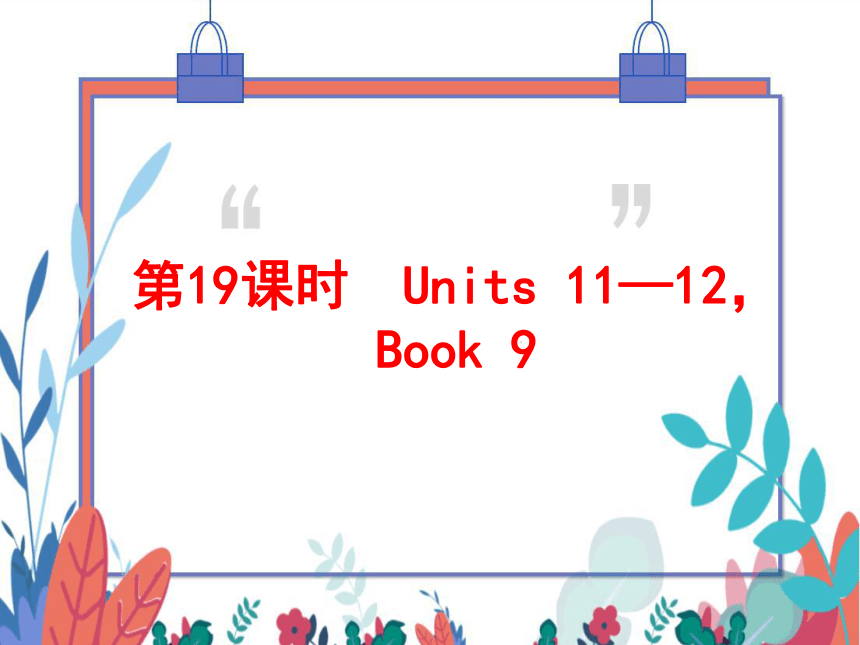 | |
| 格式 | ppt | ||
| 文件大小 | 616.0KB | ||
| 资源类型 | 试卷 | ||
| 版本资源 | 通用版 | ||
| 科目 | 英语 | ||
| 更新时间 | 2022-06-01 15:06:18 | ||
图片预览

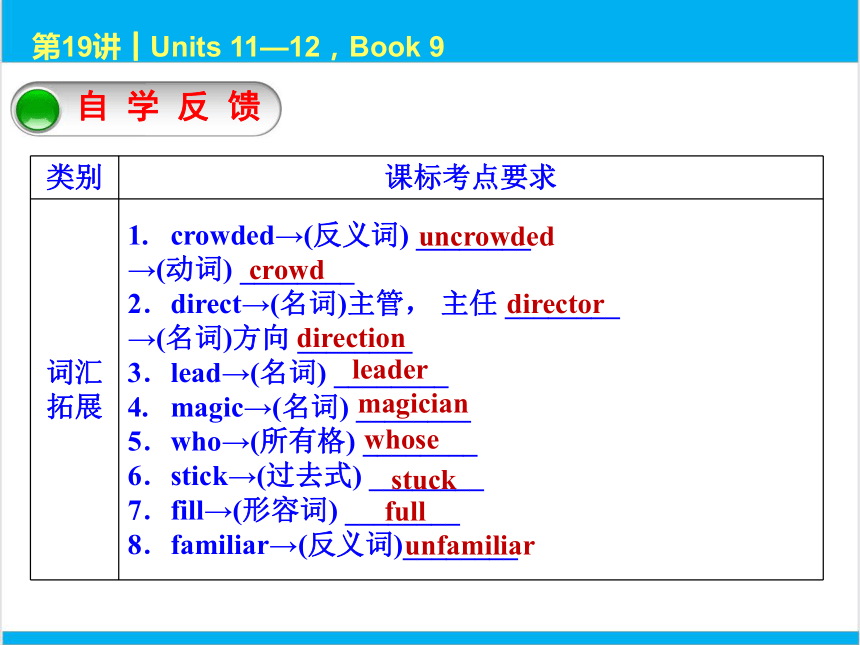
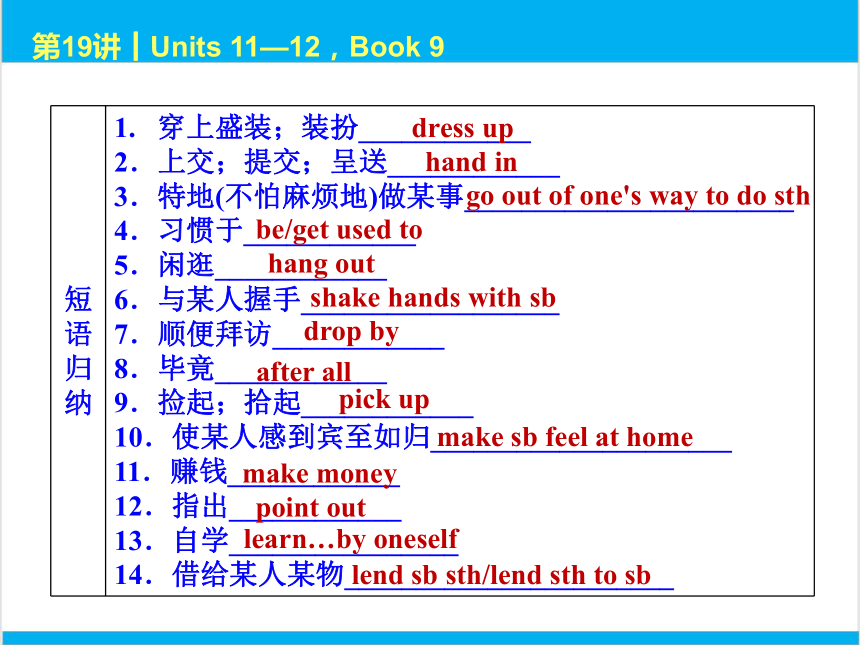
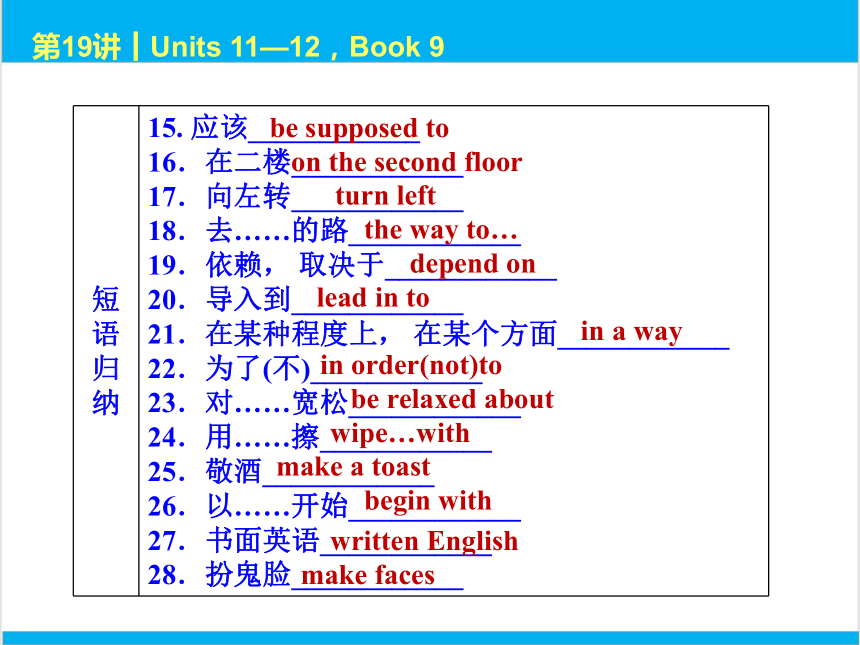
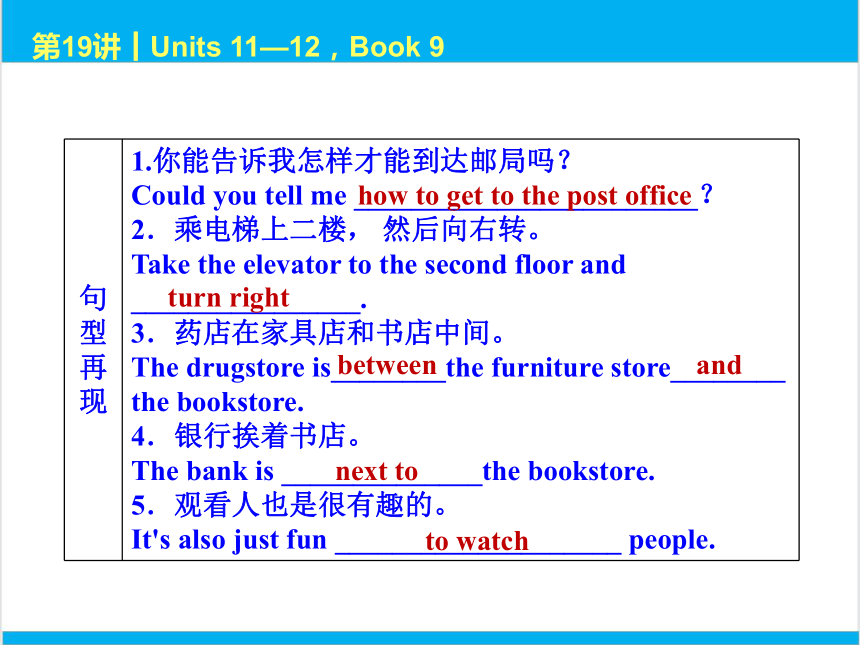
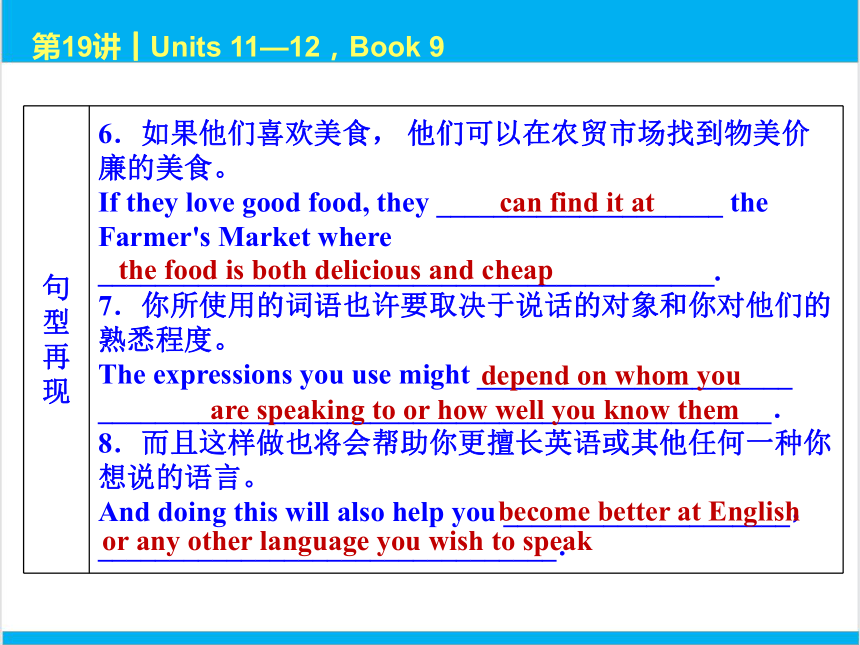
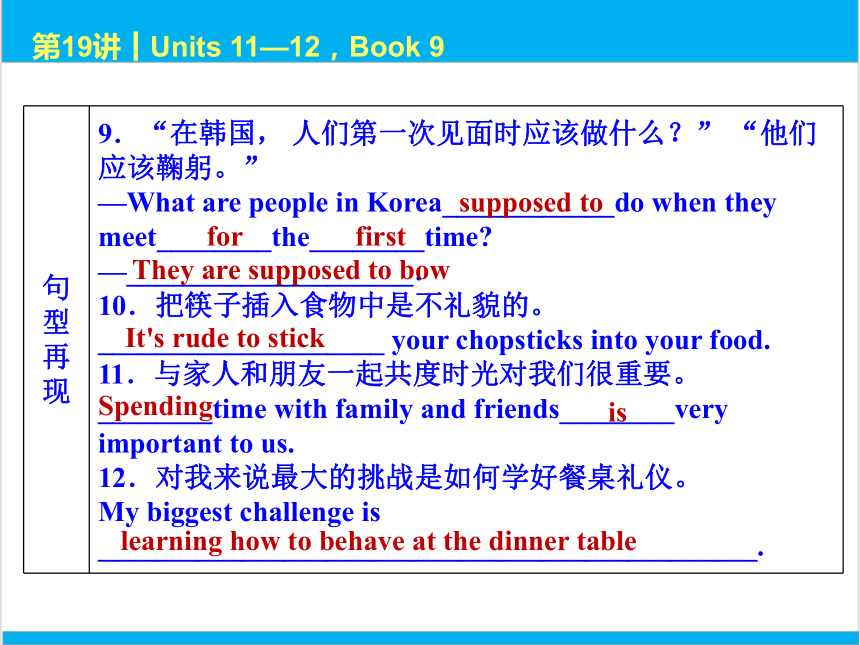
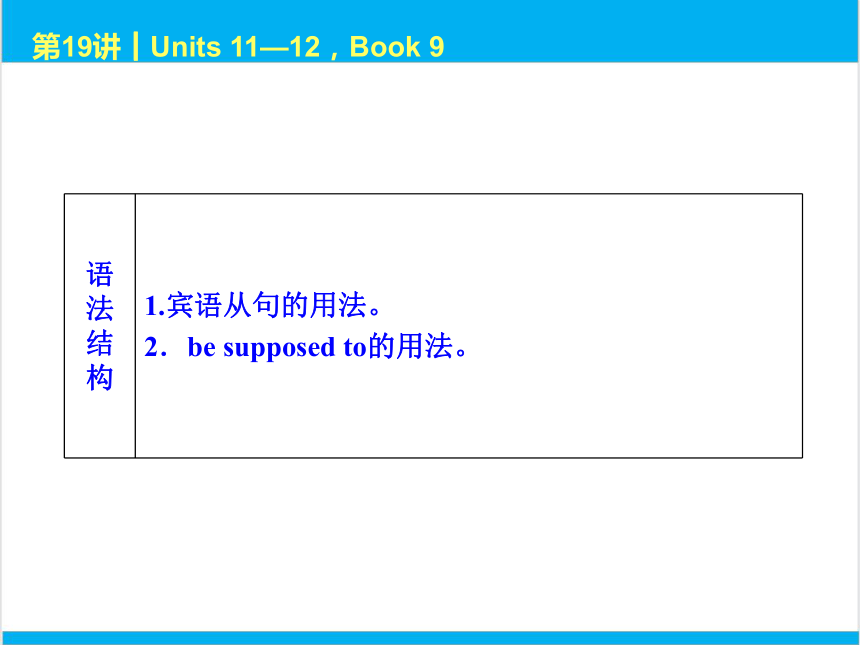
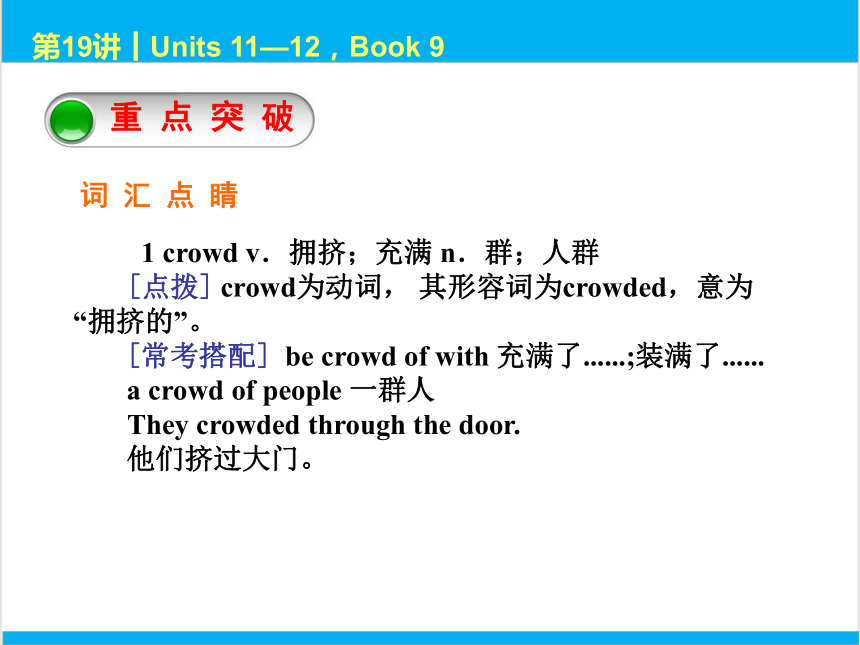
文档简介
(共20张PPT)
第19课时 Units 11—12,Book 9
自 学 反 馈
类别 课标考点要求
词汇
拓展 1. crowded→(反义词) ________
→(动词) ________
2.direct→(名词)主管, 主任 ________
→(名词)方向 ________
3.lead→(名词) ________
4. magic→(名词) ________
5.who→(所有格) ________
6.stick→(过去式) ________
7.fill→(形容词) ________
8.familiar→(反义词)________
uncrowded
crowd
director
direction
leader
magician
whose
stuck
full
unfamiliar
第19讲┃Units 11—12,Book 9
短语
归纳 1. 穿上盛装;装扮____________
2.上交;提交;呈送____________
3.特地(不怕麻烦地)做某事_______________________
4.习惯于____________
5.闲逛____________
6.与某人握手__________________
7.顺便拜访____________
8.毕竟____________
9.捡起;拾起____________
10.使某人感到宾至如归_____________________
11.赚钱____________
12.指出____________
13.自学________________
14.借给某人某物_______________________
dress up
hand in
go out of one's way to do sth
be/get used to
hang out
shake hands with sb
drop by
after all
pick up
make sb feel at home
make money
point out
learn…by oneself
lend sb sth/lend sth to sb
第19讲┃Units 11—12,Book 9
短语
归纳 15. 应该____________
16.在二楼____________
17.向左转____________
18.去……的路____________
19.依赖, 取决于____________
20.导入到____________
21.在某种程度上, 在某个方面____________
22.为了(不)____________
23.对……宽松____________
24.用……擦____________
25.敬酒____________
26.以……开始____________
27.书面英语____________
28.扮鬼脸____________
be supposed to
on the second floor
turn left
the way to…
depend on
lead in to
in a way
in order(not)to
be relaxed about
wipe…with
make a toast
begin with
written English
make faces
第19讲┃Units 11—12,Book 9
句型
再现 1.你能告诉我怎样才能到达邮局吗?
Could you tell me ________________________?
2.乘电梯上二楼, 然后向右转。
Take the elevator to the second floor and ________________.
3.药店在家具店和书店中间。
The drugstore is________the furniture store________ the bookstore.
4.银行挨着书店。
The bank is ______________the bookstore.
5.观看人也是很有趣的。
It's also just fun ____________________ people.
how to get to the post office
turn right
between
and
next to
to watch
第19讲┃Units 11—12,Book 9
句型
再现 6.如果他们喜欢美食, 他们可以在农贸市场找到物美价廉的美食。
If they love good food, they ____________________ the Farmer's Market where ___________________________________________.
7.你所使用的词语也许要取决于说话的对象和你对他们的熟悉程度。
The expressions you use might ______________________ _______________________________________________.
8.而且这样做也将会帮助你更擅长英语或其他任何一种你想说的语言。
And doing this will also help you ____________________,________________________________.
can find it at
the food is both delicious and cheap
depend on whom you
are speaking to or how well you know them
become better at English
or any other language you wish to speak
第19讲┃Units 11—12,Book 9
句型
再现 9.“在韩国, 人们第一次见面时应该做什么?” “他们应该鞠躬。”
—What are people in Korea____________do when they meet________the________time
—____________________.
10.把筷子插入食物中是不礼貌的。 ____________________ your chopsticks into your food.
11.与家人和朋友一起共度时光对我们很重要。
________time with family and friends________very important to us.
12.对我来说最大的挑战是如何学好餐桌礼仪。
My biggest challenge is ______________________________________________.
supposed to
for
first
They are supposed to bow
It's rude to stick
Spending
is
learning how to behave at the dinner table
第19讲┃Units 11—12,Book 9
语法
结构 1.宾语从句的用法。
2.be supposed to的用法。
第19讲┃Units 11—12,Book 9
词 汇 点 睛
1 crowd v.拥挤;充满 n.群;人群
[点拨] crowd为动词, 其形容词为crowded,意为“拥挤的”。
[常考搭配] be crowd of with 充满了......;装满了......
a crowd of people 一群人
They crowded through the door.
他们挤过大门。
重 点 突 破
第19讲┃Units 11—12,Book 9
2 point v.指向; 指着 n.小数点;得分
We won by 5 points. 我们赢了5分。
[拓展] (1)point at 意为“指向”, 强调指向比较近的事物。
Don't point at me with your finger.
别用你的手指指着我。
(2)point to 意为“指着”, 强调指向比较远的事物。
He pointed to the mountains far away.
他指着远处的群山。
(3)point out 意为“指出”。
My math teacher often points out my mistakes.
我的数学老师经常指出我的错误。
第19讲┃Units 11—12,Book 9
3 wonder v.想知道;觉得奇怪
[点拨] (1)wonder 表示“想知道、不知道、纳闷”, 后常接why, who, where, what, when等引导的宾语从句, 也可接带疑问词的动词不定式。
He wonders what to do next.
他想知道下一步做什么。
(2)wonder 表示“对……感到惊讶”, 后接that引导的宾语从句或动词不定式。
I wonder (that) you were able to escape.
你能逃脱, 我感到惊讶。
第19讲┃Units 11—12,Book 9
(3)wonder 表示一种委婉的请求或疑问, 后常接if或whether引导的宾语从句。
I wonder if you'd give me some advice.
我不知道你是否愿意给我些建议。
[常考搭配] wonder at 对......感到惊异/惊讶
wonder about 对......感到疑惑
第19讲┃Units 11—12,Book 9
巧 辩 异 同
1 relax/relaxing/relaxed
(1)relax 是动词, 意为“放松, 轻松”, 后接某人, 意为“使某人放松”。
A holiday will help you relax after your exams.
考试之后放个假有助于缓解紧张情绪。
These pills will relax you and make you sleep.
这些药丸有镇静、催眠的作用。
第19讲┃Units 11—12,Book 9
(2)relaxing是形容词, 意为“令人轻松的”, 常以物作主语或修饰物。relaxed也是形容词, 意为“放松的, 轻松的”, 常以人作主语。
This is a great place for a relaxing holiday.
这里是休假放松的好地方。
Take a deep breath, and then you may feel relaxed.
深深地吸一口气, 那样你会觉得轻松。
第19讲┃Units 11—12,Book 9
2 above all/after all/first of all/in all
(1)above all意为“尤其是;最重要的是”, 强调需特别对待。 We must work, above all we must believe in ourselves. 我们必须工作, 最重要的是我们必须相信自己。
(2)after all意为“毕竟;终究;到底”, 表示一种让步语气。
So she has come after all. 她到底还是来了。
(3)first of all意为“首先”, 表示一种次序。
First of all, let me introduce myself.
首先,让我来做一下自我介绍。
(4)in all意为“总共;总计”。
We have 1,000 students in all.
我们总共有1000名学生。
第19讲┃Units 11—12,Book 9
中考典例
don't ask him to study too late into the night.______ , he is only a small child.[2020·聊城]
A As a result B After all
C Best of all D For example
B
第19讲┃Units 11—12,Book 9
1 —Excuse me. Could you please tell me where I can get a dictionary
—Sure. There's a bookstore on River Road.
“打扰一下, 你能告诉我在哪儿能买到词典吗?”
“当然可以, 江河路上有一家书店。”
[句型] 常见的问路句型:
(1)Could you please tell me where…is
(2)Could you please tell me how to get to…?
(3)Could you please tell me how I can get to…?
(4)Where is…, please
(5)Could you please tell me the way to…?
(6)Which is the way to…?
(7)Is there…near here
句 型 透 视
第19讲┃Units 11—12,Book 9
2 However, in order not to offend people, learning about language etiquette is just as important as learning grammar or vocabulary. 然而, 为了不冒犯人, 学会语言礼仪和学习语法或词汇一样重要。
[句型] in order to do sth 意为“为了, 以便”, 在句中作目的状语, 可放在句首, 也可放在句中, 其否定形式为in order not to do sth (为了不做……)。
In order to earn enough money, he worked late into the night. 为了赚到足够的钱, 他工作到深夜。
Bob took down my telephone number in order not to forget it.为了不忘记我的电话号码, 鲍勃把它记下来了。
[拓展] “in order +that从句”也可表示“为了, 以便”的意思, 从句中常用can, may, could, might等情态动词。
My father works hard in order that he may support us. 我父亲辛苦地工作为了养家。
第19讲┃Units 11—12,Book 9
中考典例
A lot of famous doctors gathered in Harbin ______ save " China's most beautiful teacher"—Ms Zhang Lili. [2020·连云港]
A so that B in order to
C in order that D as a result
B
解析
空格后的save是动词原形, 故可排除A、C、D,所以选B。
第19讲┃Units 11—12,Book 9
3 You should have asked what you were supposed to wear. 你本应该问问你应该穿什么。
[句型] “should +have+过去分词”表示“过去本应做某事(但没做)”, 其否定式表示“过去不该做某事(但做了)”。该句式含有不满或责备之意。
You're right. I should have thought of that.
你是对的。我应当想到那点(但没想到)。
注意:“should+have+过去分词”还可表示“可能、揣测、推断”, 常译成“可能已经、应该已经”。
Tom has done the work for three hours, so he should have finished it already.
汤姆已经工作了3个小时, 他应该已经做完了。
第19讲┃Units 11—12,Book 9
第19课时 Units 11—12,Book 9
自 学 反 馈
类别 课标考点要求
词汇
拓展 1. crowded→(反义词) ________
→(动词) ________
2.direct→(名词)主管, 主任 ________
→(名词)方向 ________
3.lead→(名词) ________
4. magic→(名词) ________
5.who→(所有格) ________
6.stick→(过去式) ________
7.fill→(形容词) ________
8.familiar→(反义词)________
uncrowded
crowd
director
direction
leader
magician
whose
stuck
full
unfamiliar
第19讲┃Units 11—12,Book 9
短语
归纳 1. 穿上盛装;装扮____________
2.上交;提交;呈送____________
3.特地(不怕麻烦地)做某事_______________________
4.习惯于____________
5.闲逛____________
6.与某人握手__________________
7.顺便拜访____________
8.毕竟____________
9.捡起;拾起____________
10.使某人感到宾至如归_____________________
11.赚钱____________
12.指出____________
13.自学________________
14.借给某人某物_______________________
dress up
hand in
go out of one's way to do sth
be/get used to
hang out
shake hands with sb
drop by
after all
pick up
make sb feel at home
make money
point out
learn…by oneself
lend sb sth/lend sth to sb
第19讲┃Units 11—12,Book 9
短语
归纳 15. 应该____________
16.在二楼____________
17.向左转____________
18.去……的路____________
19.依赖, 取决于____________
20.导入到____________
21.在某种程度上, 在某个方面____________
22.为了(不)____________
23.对……宽松____________
24.用……擦____________
25.敬酒____________
26.以……开始____________
27.书面英语____________
28.扮鬼脸____________
be supposed to
on the second floor
turn left
the way to…
depend on
lead in to
in a way
in order(not)to
be relaxed about
wipe…with
make a toast
begin with
written English
make faces
第19讲┃Units 11—12,Book 9
句型
再现 1.你能告诉我怎样才能到达邮局吗?
Could you tell me ________________________?
2.乘电梯上二楼, 然后向右转。
Take the elevator to the second floor and ________________.
3.药店在家具店和书店中间。
The drugstore is________the furniture store________ the bookstore.
4.银行挨着书店。
The bank is ______________the bookstore.
5.观看人也是很有趣的。
It's also just fun ____________________ people.
how to get to the post office
turn right
between
and
next to
to watch
第19讲┃Units 11—12,Book 9
句型
再现 6.如果他们喜欢美食, 他们可以在农贸市场找到物美价廉的美食。
If they love good food, they ____________________ the Farmer's Market where ___________________________________________.
7.你所使用的词语也许要取决于说话的对象和你对他们的熟悉程度。
The expressions you use might ______________________ _______________________________________________.
8.而且这样做也将会帮助你更擅长英语或其他任何一种你想说的语言。
And doing this will also help you ____________________,________________________________.
can find it at
the food is both delicious and cheap
depend on whom you
are speaking to or how well you know them
become better at English
or any other language you wish to speak
第19讲┃Units 11—12,Book 9
句型
再现 9.“在韩国, 人们第一次见面时应该做什么?” “他们应该鞠躬。”
—What are people in Korea____________do when they meet________the________time
—____________________.
10.把筷子插入食物中是不礼貌的。 ____________________ your chopsticks into your food.
11.与家人和朋友一起共度时光对我们很重要。
________time with family and friends________very important to us.
12.对我来说最大的挑战是如何学好餐桌礼仪。
My biggest challenge is ______________________________________________.
supposed to
for
first
They are supposed to bow
It's rude to stick
Spending
is
learning how to behave at the dinner table
第19讲┃Units 11—12,Book 9
语法
结构 1.宾语从句的用法。
2.be supposed to的用法。
第19讲┃Units 11—12,Book 9
词 汇 点 睛
1 crowd v.拥挤;充满 n.群;人群
[点拨] crowd为动词, 其形容词为crowded,意为“拥挤的”。
[常考搭配] be crowd of with 充满了......;装满了......
a crowd of people 一群人
They crowded through the door.
他们挤过大门。
重 点 突 破
第19讲┃Units 11—12,Book 9
2 point v.指向; 指着 n.小数点;得分
We won by 5 points. 我们赢了5分。
[拓展] (1)point at 意为“指向”, 强调指向比较近的事物。
Don't point at me with your finger.
别用你的手指指着我。
(2)point to 意为“指着”, 强调指向比较远的事物。
He pointed to the mountains far away.
他指着远处的群山。
(3)point out 意为“指出”。
My math teacher often points out my mistakes.
我的数学老师经常指出我的错误。
第19讲┃Units 11—12,Book 9
3 wonder v.想知道;觉得奇怪
[点拨] (1)wonder 表示“想知道、不知道、纳闷”, 后常接why, who, where, what, when等引导的宾语从句, 也可接带疑问词的动词不定式。
He wonders what to do next.
他想知道下一步做什么。
(2)wonder 表示“对……感到惊讶”, 后接that引导的宾语从句或动词不定式。
I wonder (that) you were able to escape.
你能逃脱, 我感到惊讶。
第19讲┃Units 11—12,Book 9
(3)wonder 表示一种委婉的请求或疑问, 后常接if或whether引导的宾语从句。
I wonder if you'd give me some advice.
我不知道你是否愿意给我些建议。
[常考搭配] wonder at 对......感到惊异/惊讶
wonder about 对......感到疑惑
第19讲┃Units 11—12,Book 9
巧 辩 异 同
1 relax/relaxing/relaxed
(1)relax 是动词, 意为“放松, 轻松”, 后接某人, 意为“使某人放松”。
A holiday will help you relax after your exams.
考试之后放个假有助于缓解紧张情绪。
These pills will relax you and make you sleep.
这些药丸有镇静、催眠的作用。
第19讲┃Units 11—12,Book 9
(2)relaxing是形容词, 意为“令人轻松的”, 常以物作主语或修饰物。relaxed也是形容词, 意为“放松的, 轻松的”, 常以人作主语。
This is a great place for a relaxing holiday.
这里是休假放松的好地方。
Take a deep breath, and then you may feel relaxed.
深深地吸一口气, 那样你会觉得轻松。
第19讲┃Units 11—12,Book 9
2 above all/after all/first of all/in all
(1)above all意为“尤其是;最重要的是”, 强调需特别对待。 We must work, above all we must believe in ourselves. 我们必须工作, 最重要的是我们必须相信自己。
(2)after all意为“毕竟;终究;到底”, 表示一种让步语气。
So she has come after all. 她到底还是来了。
(3)first of all意为“首先”, 表示一种次序。
First of all, let me introduce myself.
首先,让我来做一下自我介绍。
(4)in all意为“总共;总计”。
We have 1,000 students in all.
我们总共有1000名学生。
第19讲┃Units 11—12,Book 9
中考典例
don't ask him to study too late into the night.______ , he is only a small child.[2020·聊城]
A As a result B After all
C Best of all D For example
B
第19讲┃Units 11—12,Book 9
1 —Excuse me. Could you please tell me where I can get a dictionary
—Sure. There's a bookstore on River Road.
“打扰一下, 你能告诉我在哪儿能买到词典吗?”
“当然可以, 江河路上有一家书店。”
[句型] 常见的问路句型:
(1)Could you please tell me where…is
(2)Could you please tell me how to get to…?
(3)Could you please tell me how I can get to…?
(4)Where is…, please
(5)Could you please tell me the way to…?
(6)Which is the way to…?
(7)Is there…near here
句 型 透 视
第19讲┃Units 11—12,Book 9
2 However, in order not to offend people, learning about language etiquette is just as important as learning grammar or vocabulary. 然而, 为了不冒犯人, 学会语言礼仪和学习语法或词汇一样重要。
[句型] in order to do sth 意为“为了, 以便”, 在句中作目的状语, 可放在句首, 也可放在句中, 其否定形式为in order not to do sth (为了不做……)。
In order to earn enough money, he worked late into the night. 为了赚到足够的钱, 他工作到深夜。
Bob took down my telephone number in order not to forget it.为了不忘记我的电话号码, 鲍勃把它记下来了。
[拓展] “in order +that从句”也可表示“为了, 以便”的意思, 从句中常用can, may, could, might等情态动词。
My father works hard in order that he may support us. 我父亲辛苦地工作为了养家。
第19讲┃Units 11—12,Book 9
中考典例
A lot of famous doctors gathered in Harbin ______ save " China's most beautiful teacher"—Ms Zhang Lili. [2020·连云港]
A so that B in order to
C in order that D as a result
B
解析
空格后的save是动词原形, 故可排除A、C、D,所以选B。
第19讲┃Units 11—12,Book 9
3 You should have asked what you were supposed to wear. 你本应该问问你应该穿什么。
[句型] “should +have+过去分词”表示“过去本应做某事(但没做)”, 其否定式表示“过去不该做某事(但做了)”。该句式含有不满或责备之意。
You're right. I should have thought of that.
你是对的。我应当想到那点(但没想到)。
注意:“should+have+过去分词”还可表示“可能、揣测、推断”, 常译成“可能已经、应该已经”。
Tom has done the work for three hours, so he should have finished it already.
汤姆已经工作了3个小时, 他应该已经做完了。
第19讲┃Units 11—12,Book 9
